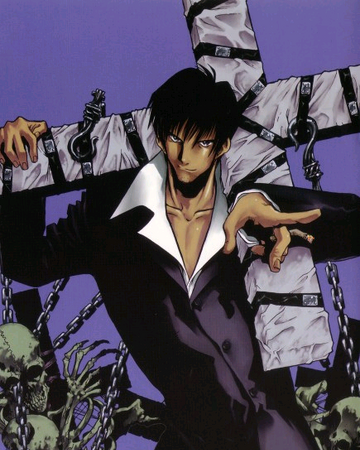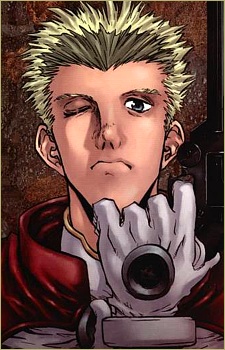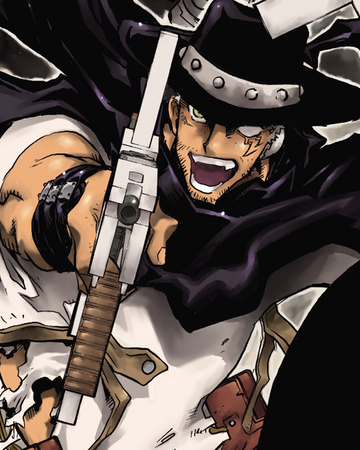Intro:

Yasuhiro
Nighthow’s Trigun was one of my first ever manga, one I read ten years
ago now. I read it because it was in my middle school library. I found the two
hardcover volumes comprising the initial series tucked away at the bottom of a
bookshelf in the corner of the library. “Why is it backwards?” I thought to
myself, flipping through it, enamored by the art.
I read those volumes so many times, upset that my library didn’t have Trigun Maximum, the sequel series. Fortunately the regular library a short walk away from the school had it, all fourteen volumes. I devoured it. And then I found out there was an anime. Needless to say, I was in love at the time. But as time passed, it kinda left my brain. I was young, and I knew Trigun was good, but I didn’t actually understand why it was good. So, it got shelved in the back of my brain as “a thing that is good.”
A few years ago now, however, I rewatched the anime with my fiancé. I loved it, if you couldn’t tell. I had resolved to reread the 16 volumes that make up both manga series. I didn’t get around to it until this year. I’m really glad I did.
Trigun is probably one of my favorite series of all time now. As a child I liked it because it looked cool and I thought it was neat that Vash didn’t kill people. As an adult I like it for those reasons, but also because of how, for lack of a word, philosophical the series is.
Now, of course Trigun is just a compelling work of fiction. All of the characters are engaging and incredibly complex, the setting is fun, the designs are cool, and the story is really gripping once it gets its teeth into you. But as I was reading the manga for Trigun Maximum it occurred to me what reading it felt like to me. It felt more like reading a dialogue of philosophy over reading a quote-un-quote “normal” manga.
Characters and Their Philosophies:
The four principle characters, Vash the Stampede, Nicholas D. Wolfwood, Legato Bluesummers, and Millions Knives are all complicated, textured characters, but they also feel like mouthpieces for philosophical arguments. Every conversation, both spoken and through action, feels like an explicit clashing of ideologies. This is normal for fiction, but it is in this clashing where Trigun plays its true hand. The story and the setting fall completely to the wayside when not just these four principal characters, but all of the characters, talk to each other. It’s reminiscent of dialogues written by philosophers like Kierkegaard or Hume.
I want to define the four principal voices in the manga quickly, the ones that do the philosophical heavy lifting. Of course there are other voices that are also important, but they exist as extensions of the principal characters’ philosophies. The principals are:

The un-aging Vash the Stampede
is a hardline pacifist. Killing is a no-no, and when he is forced to engage in
violence, he intentionally avoids killing blows and helps his adversary make it
out alive as much as possible. He seeks the ideal moral outcome, one where
everyone lives and changes for the better, above all.

Nicholas D. Wolfwood, Vash’s on-again off-again companion, is a trained assassin masquerading as a preacher. To Wolfwood, killing is a necessity, something that needs to happen some times. To him, killing is the moral thing to do if it’s to achieve an outcome that, at the time, seems moral, but isn’t ideal.

Millions Knives, Vash’s brother, is the exact opposite of Vash himself. To Knives, humanity is a stain on the galaxy. The ideal moral outcome to Knives is one where humanity is wiped out so they stop abusing the life-giving Plant organisms and so they stop consuming and consuming and consuming, as humans are want to do. To Knives, killing is an absolute rule. Humans must die.

Legato Bluesummers is much like his master, Knives. Unlike Vash and Knives, however, Legato is a mortal, a human being who has seen firsthand the horrors caused by humans on their fellow man. He is a victim of a society that failed him, and in his detached rage, he wishes to see the human race exterminated, as they only exist to hurt. Much like Knives, Legato sees killing as a must. Humans must be exterminated.
Alongside these principals, there is a side cast. Vash has Rem - his guardian as a child, Meryl Strife - his love interest, a and an adopted family. Wolfwood has the orphanage he is from and his colleagues in the assassin group he is from. Knives and Legato have the Gung-Ho guns, a group of killers hired to challenge Vash’s ideals directly.

(Livio the Double Fang is one of my favorites, one who is absent from the anime)
Vash and Wolfwood spend the majority of the manga going back and forth about the morality of killing. For example, there is a scene incredibly early on where Vash defeats the minor antagonist of the chapter. Vash, being Vash, leaves the character alive. As Vash turns to leave, however, Wolfwood executes the antagonist.
Wolfwood justifies the execution as both a mercy – Legato would simply kill them anyway when they leave for failing – and a necessity – if we didn’t kill him, he would simply kill you when you turned your back. Vash replies in anger – by killing them, he says, you take away their choice to not fire back. You take away their choice to change. Scenes like this are Trigun’s bread and butter, bringing up an argument for and an argument against violence.
It’s very similar to a manga from the early 2000’s, my favorite manga actually, Vinland Saga. Much like Vinland Saga, Trigun is a story that doesn’t just engage with violence for an aesthetic hook, but it engages with violence as the core of the story. It’s not a story with violence, but a story about violence. Violence in every aspect, physical, mental, emotional, etc.
i just love this shit a lot:
I want to avoid spoiling much of the story, as it’s a story worth experiencing. The manga series are the preferred way to go through Trigun, but the art is muddy at times and it is a story that demands a more literary mind. It’s incredibly engaging, but not as in-the-moment exciting as other series in the same genre. If you want a series that instantly hooks you, one that has your blood pumping the whole time, look to other series perhaps. However, if you are patient and wish to grapple with your own personal philosophies on violence, I implore you to read all of the manga. It is well worth your time and patience, for even if you aren't wowed by the story, you will be better off for going through a work so unique in its medium.
The anime, on the other hand, is another, albeit similar, beast.
Its 26 episode run aired before Maximum even started publication and adapts almost none of the manga, being basically entirely anime original. It exists as mostly a thematic overview, a trailer of sorts for the concepts that the manga discusses deeply. However, it’s just as engaging philosophically in its own right. It's also, to be honest, more instantly engaging as a story, sharing an episodic structure with works like Cowboy Bebop. The plot stakes backseat to character-driven short stories that all tie into the greater overarching themes of the story.
The characters are the same and the core situations, though in completely different contexts story-wise, are still there. It’s just not as meaty as the manga. If Trigun’s anime is like a nice dinner, Trigun Maximum is a thematic buffet that you want to keep eating at. It's one that I am going to be eating at for the rest of my life, that's for certain.
TL;DR:
All this to say that, in my re-examination of this franchise that helped define my tastes in fiction and my own personal philosophies, I love Trigun a lot. I don’t think it’s a spoiler that Trigun takes Vash’s side. No one has the right to take the life of another. However, if you do commit that sin, you are not marked for hell forever. Your ticket to the future is always blank, and with a blank ticket, you can go anywhere, do anything. Trigun states that the song of humanity is a never-ending song of change, of growth, of, well, life.


No comments:
Post a Comment